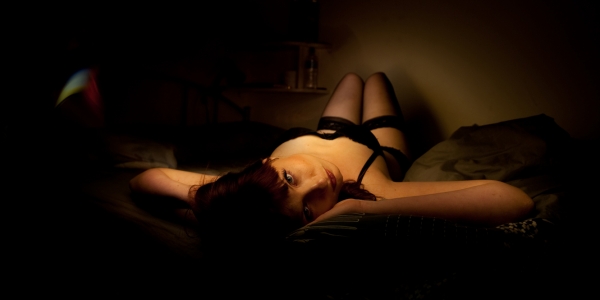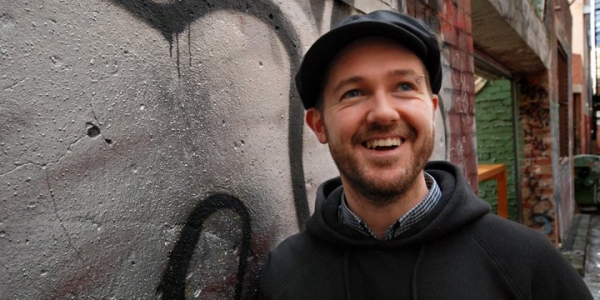The bold project, which is fittingly set in a bedroom, presents two characters – Helen and Elizabeth – who are best friends yet possess polarising views on monogamy. Social expectations of sex and the acceptability of a sexual liberal lifestyle have certainly progressed in recent decades. However, there is no defined custom, and thus the play aims to investigate these ideals.
“It really looks at the issues of promiscuity versus monogamy and the idea of whether that’s a good thing or a bad thing. I think people feel really pressured to define themselves by whether they’re single or whether they’re a couple. A lot of people feel pressured to have a partner. I guess just looking at that and not answering the question either, we’re not really stating an agenda, I think it’s just asking the question,” says assistant director Stephanie Speirs, who is also company director.
In today’s society, where we are heavily exposed to sexual imagery and messages through the media and advertising, productions such as Tell Them That It Rained Too Hard explore themes that appeal to people from diverse age groups, backgrounds and value systems.
“It’s interesting to ask the question and hear the responses. Audience members have had very different responses and it’s also something that can be quite close to people’s hearts because a lot of people go through a stage in their lives, whether it’s in their early 20s or late 20s or later on, where they suddenly question, ‘What am I doing? What are the choices I’m making? Do I want to be committed to one person for the rest of my life?’,” she raises. “You get people who are coming up to getting married and they’re going, ‘Oh my god this is a really big decision’ and I think that it’s a really familiar crisis that a lot of people go through where they question ways that we do that and is it the right thing? It is close to a lot of people’s hearts; I think it’s really touched a lot of nerves definitely throughout the whole process. We’ve had a lot of really fiery discussions with friends and also on the team just talking about our own values and how we feel about issues in the play.”
Indeed, discussions amongst the creative team, which also includes director Celeste Cody and writer Tom Pitts, have played an essential role in the development of the play. “Tom has been a colleague of mine for quite a few years because we went through [university] together, same with the director Celeste. We’ve all worked and I’m sure that a lot of our conversations over the years have provided sparks of inspiration for Tom writing the piece but it’s very much his voice and Celeste’s vision I think that come together. We’ve all come from very different backgrounds and we all have quite different views and values and that’s something we really celebrate and I think it makes our work really diverse and our friendships pretty exciting and I guess it’s nice to explore that through the play.”
It is interesting to contemplate why there is disparity amongst people within a social group in regards to their sexual views. Two best friends from very similar upbringings can often have conflicting views on monogamy. Yet, it is difficult to discern what one particular factor influences our decision on our own sexual liberation. “I think it’s everything. It could be a cultural thing or a family thing. People ask you, ‘Are you seeing anyone?’ and that’s a relevant question as to who you are. And it’s something that people want to know about you when they first meet you as well…There’s also not a lot of room for grey in that, which is something that’s only just starting to become more public like this idea of friends with benefits…There’s not so much black and white, you’re either single and you’re not seeing anyone or you’re in a monogamous relationship. It’s now becoming a little more accepted to be somewhere in between.”
Another intriguing aspect of the play is that the two protagonists are female which, intentionally or not, stimulates discussion about gender inequality in sexual lifestyle choices and the judgement women receive in contrast to men. “It’s been quite accepted that men can be bachelors for years and it’s kind of not an issue and they can be promiscuous and it’s not really anything to be remarked upon and that’s I guess why [Tom Pitts] has chosen [the characters] to be women because that’s when you hear things like “women are sluts” and looked down upon. And if they don’t have a boyfriend people feel sorry for them, whereas you can have guys and it’s like ‘oh you know he doesn’t want to settle down he’s commitment-phobic whatever’ but to meet a woman who’s commitment-phobic and quite happy to be single and just sleeping around with lots of different people – there’s a lot of judgement that comes along with that.”
Speirs emphasises to me that the play aims to provoke thought rather than didactically present a particular view. Regardless of an audience member’s views on promiscuity and monogamy, there are characters and ideas in Tell Them That It Rained Too Hard that they may relate to and therefore discover something about themselves. “We’ve tried to represent both sides of the coin. You’ve got the main character, Helen, who’s quite promiscuous and she really believes that you can have sex and you don’t have to be in love with someone and she wants to have that lifestyle where she’s being with different people and not committed to one person. And then there’s her best friend Elizabeth who’s settled down and getting married and…both girls question their choices. You do have this strong character Helen who’s really standing up for this new modern way of thinking and not settling down and not committing and she goes through her own crisis whether she’s doing the right thing and so does Elizabeth. It’s interesting and the characters are so real and you can really emphasise with both of them.”

